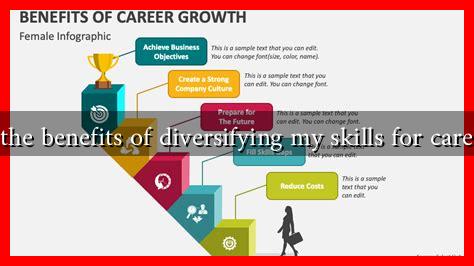-
Table of Contents
What are the Benefits of Diversifying My Skills for Career Growth?
In today’s fast-paced and ever-evolving job market, the importance of diversifying your skills cannot be overstated. As industries transform and new technologies emerge, professionals who possess a broad skill set are often more adaptable and better positioned for career advancement. This article explores the numerous benefits of diversifying your skills and how it can significantly impact your career growth.
1. Enhanced Employability
One of the most immediate benefits of diversifying your skills is enhanced employability. Employers are increasingly looking for candidates who can wear multiple hats and contribute to various aspects of their organization. According to a report by the World Economic Forum, 94% of business leaders expect employees to pick up new skills on the job. This statistic underscores the necessity of being versatile in today’s workforce.
- Broader Job Opportunities: With a diverse skill set, you can apply for a wider range of positions, increasing your chances of landing a job.
- Competitive Edge: In a crowded job market, having unique skills can set you apart from other candidates.
2. Increased Adaptability
In an era marked by rapid technological advancements and shifting market demands, adaptability is crucial. Diversifying your skills allows you to pivot more easily when changes occur in your industry.
- Resilience to Job Market Changes: Professionals with varied skills can transition between roles or industries more smoothly, reducing the risk of unemployment.
- Ability to Embrace New Technologies: A diverse skill set often includes familiarity with various tools and technologies, making it easier to adopt new systems.
3. Improved Problem-Solving Abilities
Having a range of skills can enhance your problem-solving capabilities. When you approach challenges from different angles, you are more likely to find innovative solutions.
- Cross-Disciplinary Insights: Skills from different fields can provide unique perspectives on problems, leading to creative solutions.
- Collaboration: A diverse skill set enables you to work effectively with colleagues from various departments, fostering teamwork and collaboration.
4. Greater Job Satisfaction
Engaging in continuous learning and skill diversification can lead to greater job satisfaction. When you expand your skill set, you often find new interests and passions that can reignite your enthusiasm for your work.
- Personal Growth: Learning new skills can be fulfilling and boost your confidence.
- Career Advancement: As you become more skilled, you may find opportunities for promotions or new roles that align with your interests.
5. Networking Opportunities
Diversifying your skills can also open up new networking opportunities. Engaging in different fields or industries allows you to meet a wider range of professionals, which can be beneficial for your career.
- Building Relationships: Networking with individuals from various backgrounds can lead to collaborations and job referrals.
- Access to Resources: A broader network can provide access to resources, mentorship, and information about job openings.
Case Study: The Versatile Professional
Consider the case of Sarah, a marketing professional who decided to diversify her skills by learning data analytics and graphic design. By doing so, she not only improved her employability but also became a key player in her organization. Her ability to analyze data and create compelling visuals allowed her to lead successful marketing campaigns, ultimately leading to a promotion. Sarah’s story exemplifies how diversifying skills can lead to tangible career growth.
Conclusion
Diversifying your skills is not just a trend; it is a strategic approach to career growth in an increasingly competitive job market. The benefits are manifold, including enhanced employability, increased adaptability, improved problem-solving abilities, greater job satisfaction, and expanded networking opportunities. By investing in your skill set, you position yourself for success and open doors to new opportunities. As the job landscape continues to evolve, those who embrace lifelong learning and skill diversification will undoubtedly thrive.
For more insights on career development and skill diversification, consider visiting Forbes.

